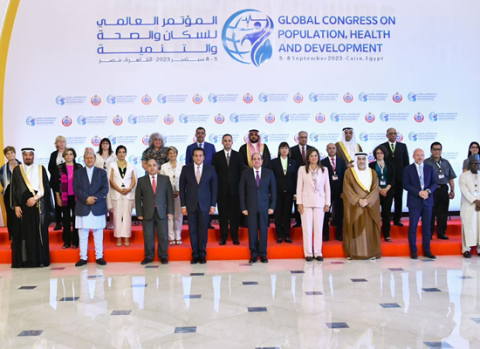

A Jordanian delegation participated in the First World Conference on Population, Health and Development, organized by the Ministry of Health and Population in the Arab Republic of Egypt. The conference, under the campaign, "Healthy Populations for Sustainable Development" was held under the patronage of President Abdel Fattah Al-Sisi of Egypt. Attending the conference was the Egyptian Minister of Health and Population, a number of ministers and senior Egyptian statesmen, parties concerned with health, population and development issues at the global, regional and national levels, representatives of UN organizations, civil society, the private sector, entrepreneurs, researchers, specialists in the fields of health, population and development, and representatives of the media as well as influencers.
The Jordanian delegation participating in the conference was headed by Prof. Dr. Issa Al-Masarweh HPC Secretary General; Ali Al-Mutlaq/ Director of Studies and Policies Unit and Coordinator of Share-Net Jordan; representatives of the Ministry of Health, the Royal Medical Services, the University of Jordan, the United States Agency for International Development USAID/ Jordan, and a number of civil society organizations and professionals.
The four-day conference aimed to highlight the interdependence and mutuality amongst population, health and sustainable development as well as create a platform for the exchange of experiences and knowledge to promote the health and wellness of populations while supporting economic and social development. Among the goals of the conference also were to reach certain recommendations and a roadmap for means to adapt to global challenges and improve health outcomes, clarify the impact of population changes and migration on health and development, empower and engage all stakeholders in shaping global health and development programs to foster valuable partnerships. Moreover, the conference also aimed to mobilize resources in order to accomplish effective and constructive interventions, as well as promote the application of evidence-based research and scientific recommendations to address population, health and development challenges.
The conference is regarded a breakthrough heading towards new horizons for experts and policymakers worldwide to exchange experiences within a dialogue framework aimed at deliberating the changing and interrelated relationships between health, population, the environment and development. Moreover, the conference also provided, by means of a wide range of activities, the opportunity to exchange experiences and best practices, and propose plans, strategies and road maps to meet the challenges taking into account the successive changes, especially in light of the demographic, social and economic transformations the world is currently witnessing. These transformations pose significant challenges to achieve the United Nations Sustainable Development Goals (SDGs) and ensure a healthy life and well-being for all.
Sessions during the conference addressed a number of topics, most notably, good governance for healthy populations, health diplomacy at all times, i.e. during periods of stability and in times of uncertainty. Among the sessions also were deliberations on population dynamics and environmental sustainability, the strategic framework for health in Egypt (2023-2030), climate change, health and resilience. In addition, sessions included discussions on building sustainable and climate-resilient healthcare systems for the future, and the demographic dividend: economic impacts and opportunities, women's empowerment and gender equality to advance population health, as well as the role of civil society in supporting healthy populations for sustainable development. Primary health care, the cornerstone of development, and public health: ensuring healthy lifestyles and promoting well-being for all were also on the agenda in addition to sexual and reproductive health for all. The conference also addressed the all-inclusive health coverage, mental wellness and substance abuse. Furthermore, the conference dealt with issues beneficial to inclusive population development and well-being, public-private partnership in the health care sector, and investing in human capital which is regarded as a catalyst for population, health and development.
On the sidelines of the conference, and with participation of many partners and stakeholders, an exhibition was held to display the latest technologies in the fields of population, health and development.
The conference concluded with the declaration of a number of recommendations, most notably of which, were the following: the importance of investing in the human capital by calling on all partners from the relevant ministries and the private and national sectors to invest in comprehensive public services, especially in the fields of health, education, transport and energy. Another recommendation ensuing from the conference was the call to create appropriate jobs and employment opportunities; facilitate access to social protection, promote gender equality and empower women as key strategies for developing the human capital. More recommendations included facilitating economic stability and competitiveness, enhancing environmental resilience and appropriate and relevant responses to climate change. Recommendations also called on the importance of activating and maximizing the role of NGOs and civil society in mobilizing community and family support, increasing access to reproductive health services including family planning, and collaborating with governments in the process of preparing and delivering care based on informed choices.
Lastly, the conference recommended increased international and domestic funding for population, health and development programmes for the full, effective and accelerated implementation of the action plan of the International Conference on Population and Development, in particular programmes related to ending unmet family planning needs, ending preventable maternal mortality and ending harmful practices.
Additionally, the conference emphasized the importance of increased participation and partnership with the private sector in the population, health and development programs and promoting trends in support of society's adoption of the concept of the small family unit, taking into account the spacing between pregnancies for a period of (3-5 years) to achieve population goals and benefit from the demographic opportunity which can only be achieved by low levels of reproduction. Furthermore, the conference highlighted the importance of considering the population dimension as an essential element in the preparation of and drawing up executive plans and programs at various levels, and introducing the population dimension among the factors determining the priorities of action and the trade-off between options and available alternatives. Lastly, the conference recommended opening new horizons for job opportunities for young people, especially women in new urban communities, to support women's empowerment and integrate population issues into the educational process.







